Pope Francis - the first year: Is the rebel too good to be true?
He is cleaning up the Vatican bank. He thinks the Catholic Church should worry less about homosexuality and more about the poor. He has ruffled feathers - but, asks his biographer Paul Vallely, is he as radical as he seems?
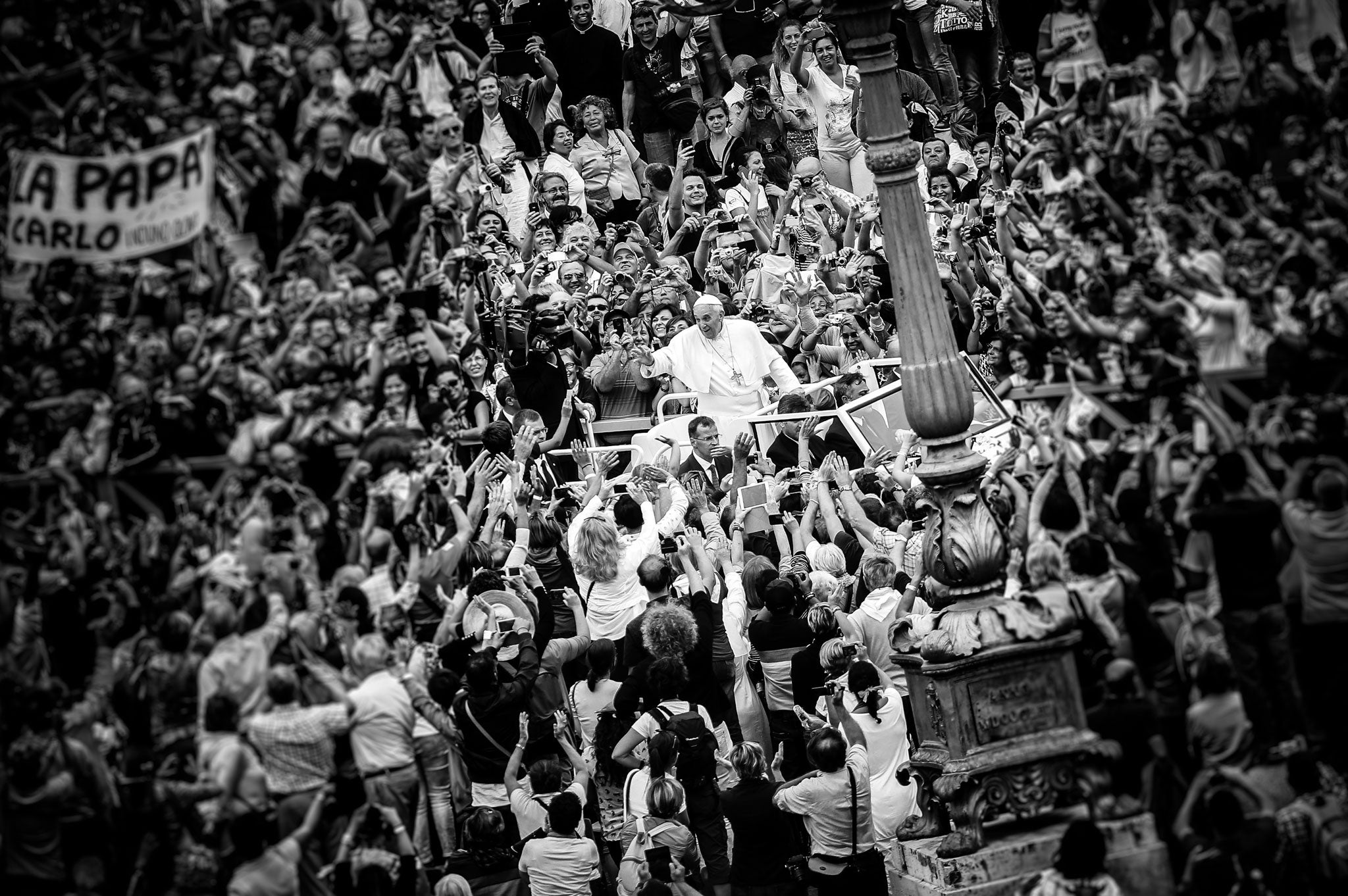
Your support helps us to tell the story
From reproductive rights to climate change to Big Tech, The Independent is on the ground when the story is developing. Whether it's investigating the financials of Elon Musk's pro-Trump PAC or producing our latest documentary, 'The A Word', which shines a light on the American women fighting for reproductive rights, we know how important it is to parse out the facts from the messaging.
At such a critical moment in US history, we need reporters on the ground. Your donation allows us to keep sending journalists to speak to both sides of the story.
The Independent is trusted by Americans across the entire political spectrum. And unlike many other quality news outlets, we choose not to lock Americans out of our reporting and analysis with paywalls. We believe quality journalism should be available to everyone, paid for by those who can afford it.
Your support makes all the difference.No Pope had ever before dared to take the name Francis. And for good reason. St Francis of Assisi was the son of a rich merchant who in the 13th century cast aside his lavish lifestyle, giving away the fine clothes off his back. They called him Il Poverello – the little poor one. But this was more than an embrace of poverty. It was a challenge to what the man who was to become the first Pope Francis has called the "luxury, pride, vanity of the civil and ecclesiastical powers of the time".
A pope who took the name of the great saint of the poor would be casting down a gauntlet that he, and his church, should be tested against the most demanding of standards. On 13 March, 2013, Jorge Mario Bergoglio took that name. One year on, how has Pope Francis measured up?
As his attitudes and priorities emerge, it is clear that he wants a church for the poor, that puts mercy before moralising, compassion into action and which embraces rather than excludes. There is still debate about whether the 266th pontiff is doctrinally liberal or conservative. But there is no doubting that he is a radical. It has also become clear that there are three key areas on which he has yet to deliver if he is to fulfil the promise of his chosen name.
He has certainly changed the style of the papacy. Gone is the formality and pomp. His predecessor, Benedict XVI, had stepped out on to the balcony of St Peter's in 2005 clad in red velvet, ermine and brocaded silk. On his chest was a cross of bejewelled gold. He grinned broadly and clasped his hands together above his head like a victorious boxer.
By contrast, in 2013, Pope Francis emerged in plain white, wearing only the plain metal cross from his time as the "bishop of the slums" in Argentina, and stood, dazed and blinking, an image of humility, simplicity and hope.
Within days, in what amounted to a programme for the new papacy, he had rejected the grand apostolic palace as his home and moved into a hostel for visitors, adopted plainer forms of church liturgy and begun using his old mobile phone to ring home to cancel the papers or get his shoes repaired.
They were only the first of a long string of gestures of ostentatious humility – carrying his own suitcase, driving in a nondescript small car, taking selfies with teenagers, inviting homeless people to his birthday party, disciplining a German bishop for his exorbitant lifestyle – and most dramatically, embracing and kissing the head of a man with an 'Elephant Man' disfigurement. When I shook hands with Pope Francis, I noticed his wristwatch was a plastic Swatch.
But there was more to this than style. As befits a church in which sign and symbol are seen as sacraments rather than mere emblems, there are hints of substance behind the semiotics.
In the run-up to his first Easter, instead of washing the feet of male clerics in church, as is traditional, Francis visited a jail and kissed the feet of prisoners, including those of women and of Muslims. "The Pope is breaking the rules," one conservative complained; "No, the Pope is remaking the rules," an aide countered.
For his first trip outside Rome, he chose Lampedusa, the southerly Italian island on whose shores the bodies of dead African migrants wash up. Saying Mass on an upturned boat he called for a "reawakening of consciences" in a world which has "forgotten how to cry" for refugees, displaced persons and victims of human trafficking.
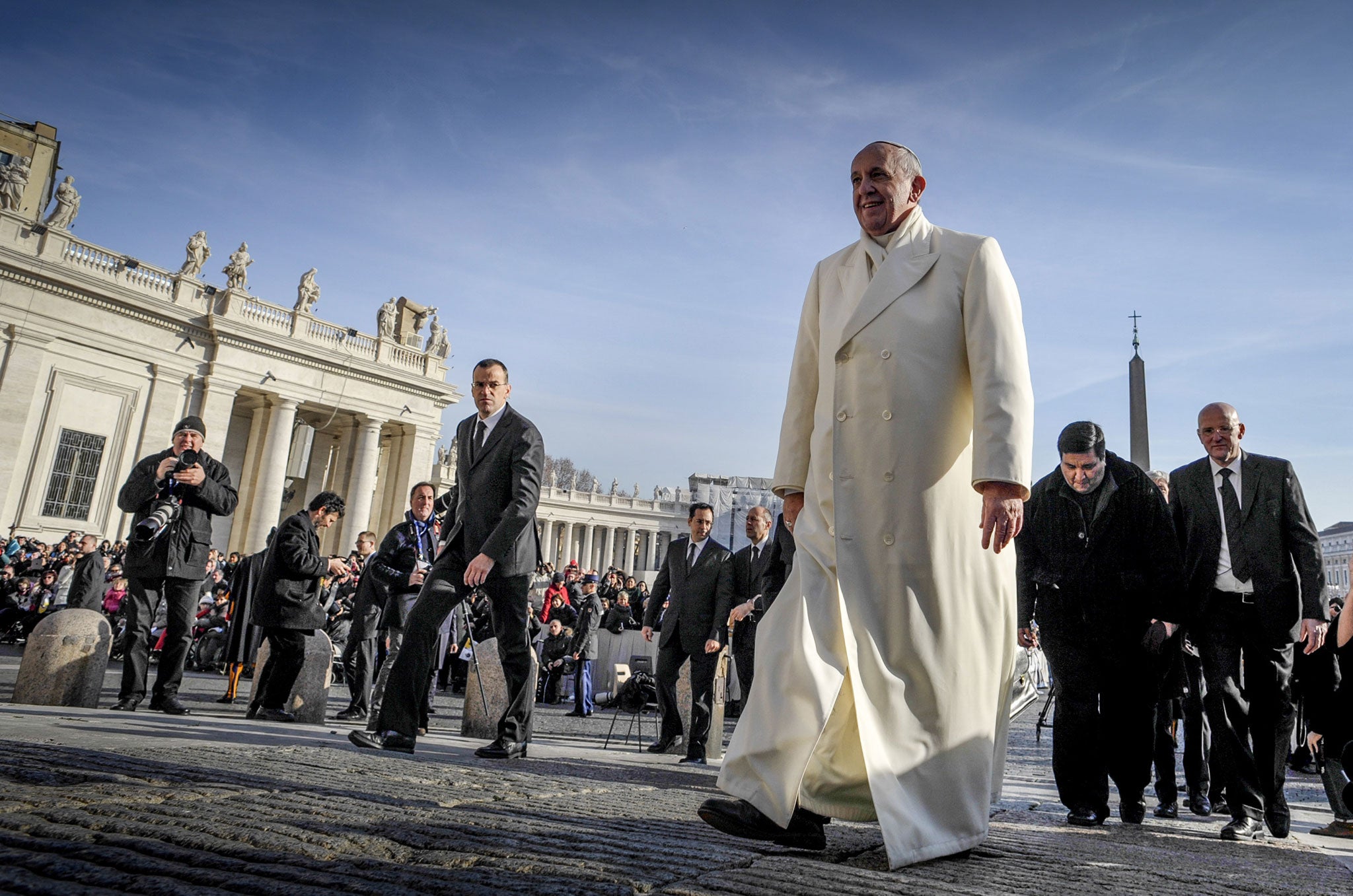
He caused a stir with his pronouncement that atheists could go to Heaven if they followed their consciences and behaved ethically.
But the words which sent the biggest ripples were his assertion: "If a person is gay and seeks God and has good will, who am I to judge?"
The five words "who am I to judge?" have exemplified the new Pope's approach. They do not change doctrine. Francis reaffirmed the Catholic Church's unyielding insistence that homosexual acts are sinful, though homosexual orientation is not. But he replaced a cold compassion of thinly-veiled distaste and hostility with human warmth.
All this has produced an extended honeymoon for Francis with the secular world. Time magazine made him their Person of the Year. He was the most talked-about person on Facebook in 2013. He appeared on the cover of gay magazines and Rolling Stone for what it called his "gentle revolution" after the "disastrous papacy" of his predecessor, with its decade of scandal over sexual abuse and the leaking of the Pope's private papers by his own butler, revealing intrigue and in-fighting in the Vatican.
Some in the Church have dismissed all this as a fantasy Francis conjured from the wishful thinking of the secular world, but there is more truth to it than traditionalists would allow.
Inside the Vatican, the charismatic new pontiff has shown a ruthless face. The Jesuit Pope baldly accused his Church of having grown "obsessed" with abortion, gay marriage and contraception. He condemned its preoccupation with "small-minded rules". He described the Vatican as "the leprosy of the papacy" and criticised a certain kind of ambitious careerist priest as "vain" butterflies, "smarmy" idolaters and "priest-tycoons".
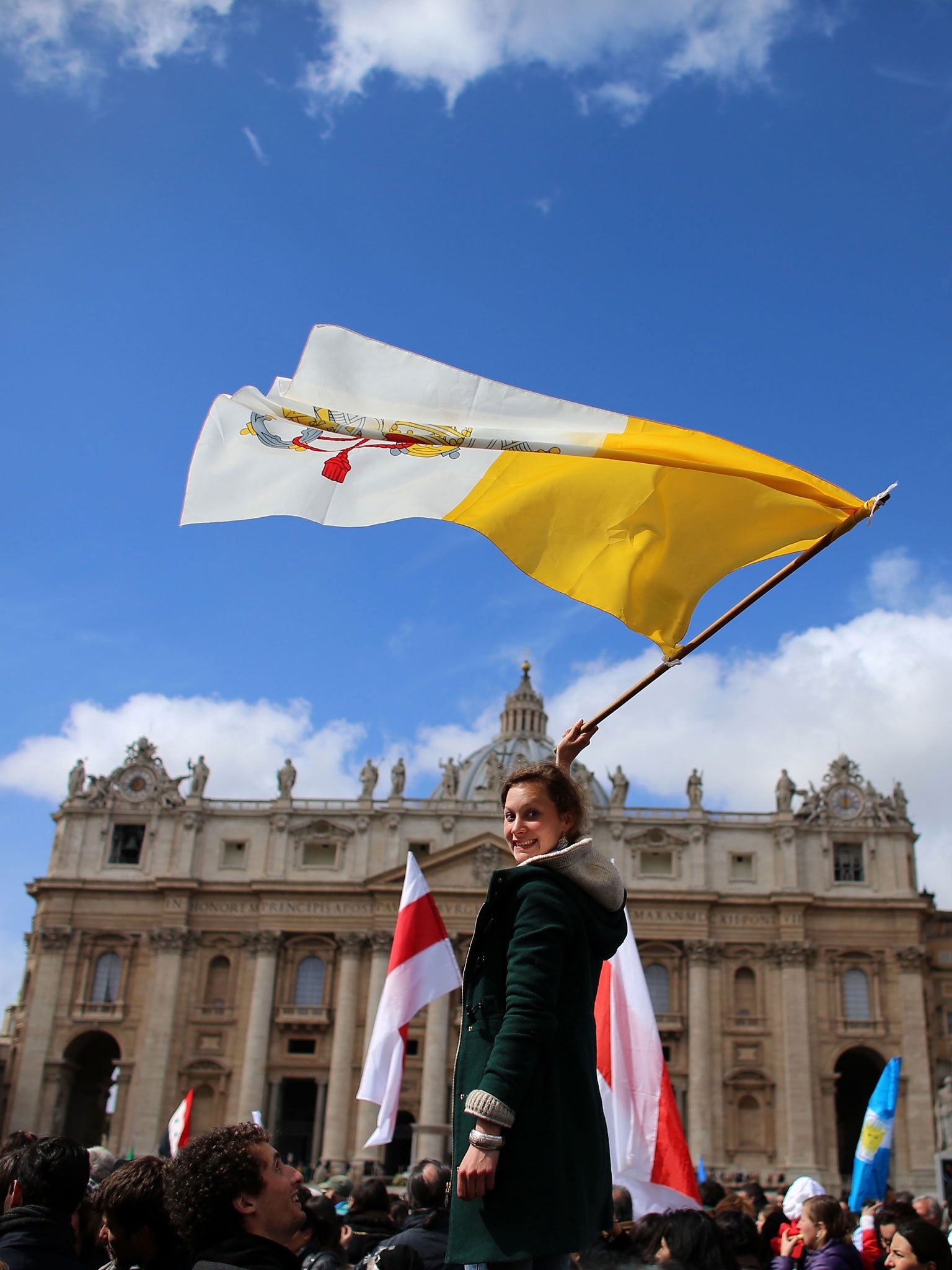
He has abolished the honorific priestly title Monsignor (My Lord), feeling it smacks of the court of a medieval monarch. He has sent large numbers of junior officials away from the Vatican to work in ordinary parishes. He has told trainee papal diplomats and those who appoint new bishops that he wants to see a new kind of candidate: a priest is a shepherd who must "smell of his sheep". And he has kick-started the process of the reform of Rome's dysfunctional and often self-serving bureaucracy, the Curia.
In several areas, Francis has acted with the swift decisiveness which characterised his time as Archbishop of Buenos Aires, where he closed down a corrupt church bank.
In Rome, the Vatican bank, known officially as the Institute for the Works of Religion, has long had a reputation as an offshore tax haven and vehicle for Mafia money-laundering. Francis has replaced four of the five cardinals supervising it, just 11 months into their five-year term. He has brought in outside consultants, the Promontory Financial Group, to review the bank's 33,000 accounts. Several hundred have been closed already.
He has also set up an independent commission, which includes a female law professor from Harvard, to look at long-term structural reform, conversion to an 'ethical bank' or even the possible closure of the scandal-hit institution.
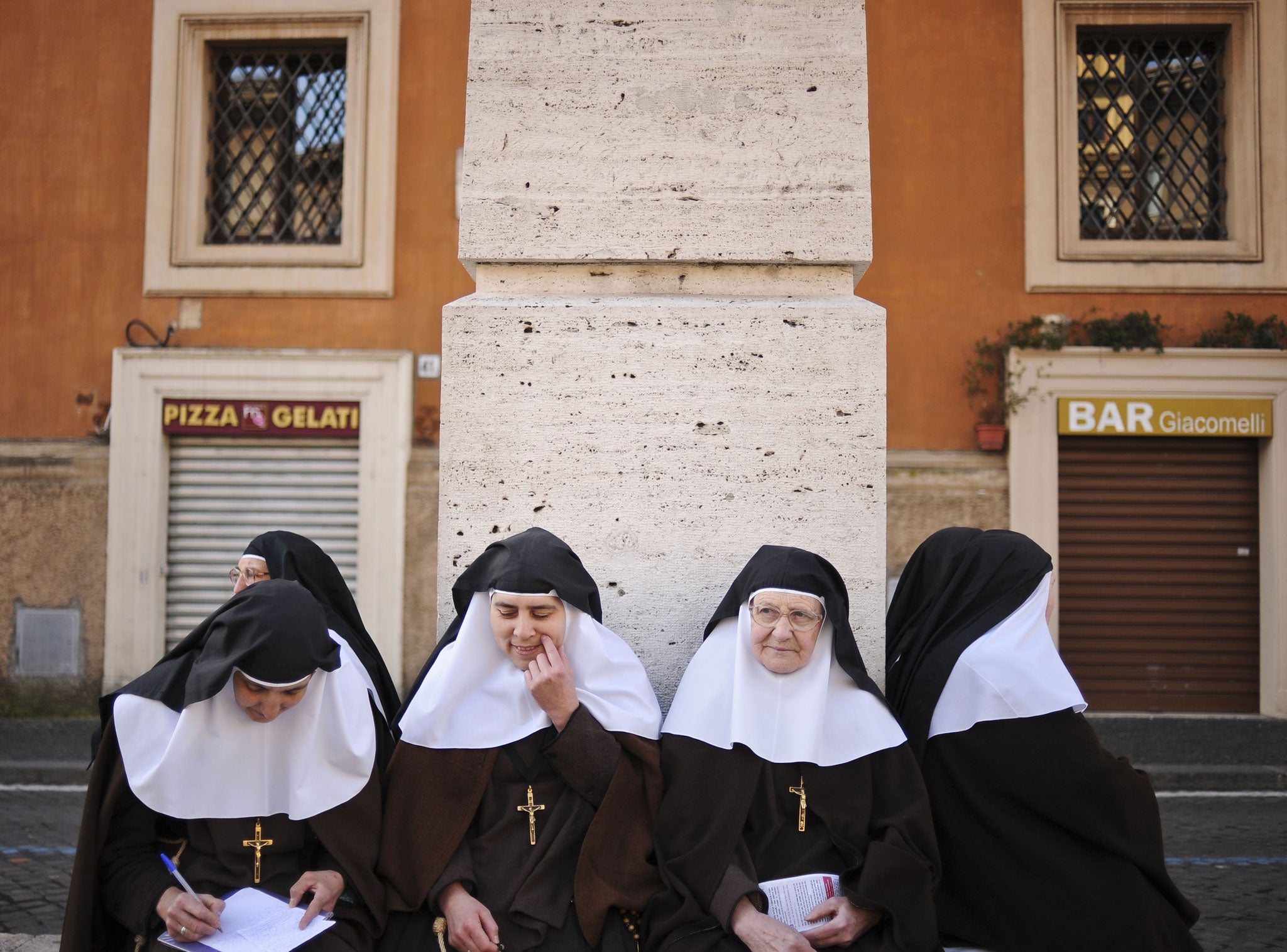
Francis has also brought in the consultants McKinsey to modernise the Vatican's communications operations, and KPMG to overhaul the Curia's accounting procedures, while Ernst & Young are reviewing management and economic activity within the Vatican State's government – for which Francis has set up a new overarching finance ministry with an independent watchdog.
But he has also begun an overhaul at a more profound level. The new Pope has set up a new Council of eight Cardinal Advisers, dubbed the C8, to completely revise the workings of the Curia. Their brief is to change the Vatican from the court of an absolute monarch to a secretariat, to serve the needs of local churches around the world. One leading Italian ecclesiastical historian, Professor Alberto Melloni, has described this as the "most important step in the history of the Church for the past 10 centuries".
The eight hand-picked by the Pope, drawn from every continent, range from liberals to conservatives. But each has previously been an outspoken critic of the way that Vatican officials have behaved as though they were the masters of the Church around the world, rather than its servants. Francis has given notice to the Curia's clerical careerists who spent the past two papacies arrogating power to themselves. The Church, he has told them, should be less of a hierarchy and more of a community.
But Pope Francis is not waiting for the C8's reform proposals before he acts. He has made a series of appointments to top positions within the Church, replacing reactionary figures with more open-minded clerics. Most pointedly, he has purged hardliners such as Cardinal Raymond Burke – the extravagantly-dressed former archbishop of St Louis – from the committee which oversees the appointment of bishops. In their place, he put in moderates such as the Archbishop of Westminster, Vincent Nichols, who was made a cardinal last month.
In all, 19 men were made cardinals then. Their composition gave another clear indication of Francis's direction of travel. Only a few were from Europe; most were from the developing world and some of the poorest places on Earth, including Haiti, Burkina Faso and Ivory Coast.
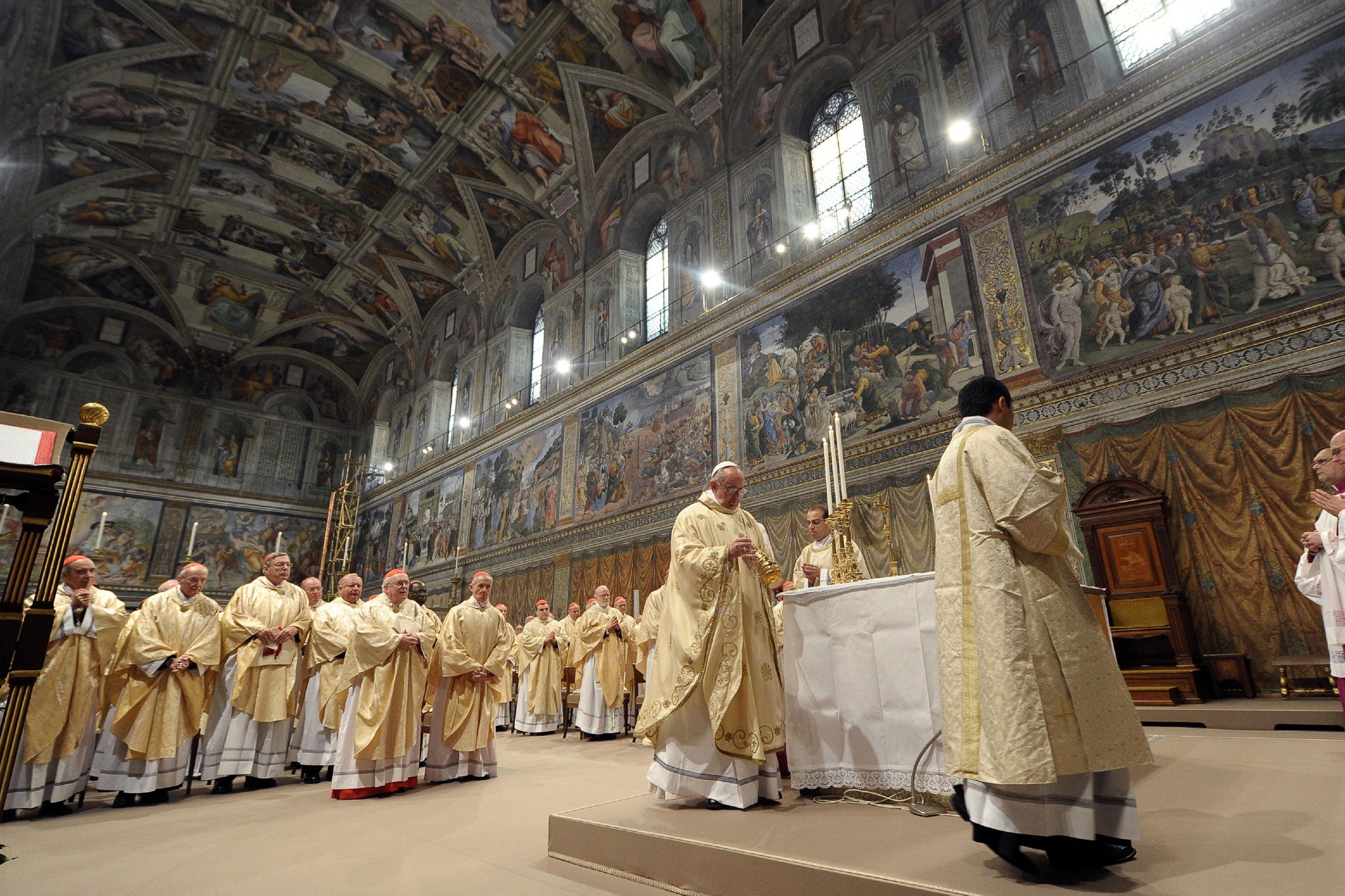
Yet what is less clear in all this, is where Pope Francis stands on the great doctrinal fault-line which splits the Catholic Church between conservatives and liberals. Both sides have been spinning the facts to suit their ideologies.
Some ultra-traditionalist Catholics worry that the new Pope's liking for speaking off-the-cuff in his daily sermons could undermine the carefully-laid foundations of Catholic doctrine; hardliners, such as the Italian historian Roberto de Mattei, have branded the "who am I to judge?" remark as "a road that leads to schism and heresy".
But many conservatives, such as the US intellectual George Weigel, author of a biography of John Paul II, are still attempting to lay claim to Francis, insisting he is "in full continuity" with his two predecessor popes.
On the other side, the progressives often described as the social-justice wing of the Church, have been reinvigorated by Francis's arrival. Liberal theologians have stopped looking over their shoulders and are speaking freely. Some bishops are becoming more outspoken. The climate of fear has gone.
There is a common misunderstanding in the secular world that the spectrum from conservative to liberal among Catholics is political. There are political divergences, but they are not the main points of contention. A tradition of Catholic social teaching began in 1891 when Pope Leo XIII tried to chart the original 'third way' between capitalism, which he saw as callous and exploitative, and communism, which he saw as promoting atheism. Since then, most popes have been critical of unregulated capitalism.
Francis uses starker, more political language and condemns trickle-down economic theories. He spoke about "slave labour" when a garment factory in Bangladesh collapsed, killing over a thousand low-paid workers. He has said that the waste of food in our throwaway culture is a form of "stealing from the hungry" and called capitalism an idolatry and a tyranny.
Phrases like that have led loud-mouth American talk-show host, Rush Limbaugh, to assert that Francis is a Marxist.
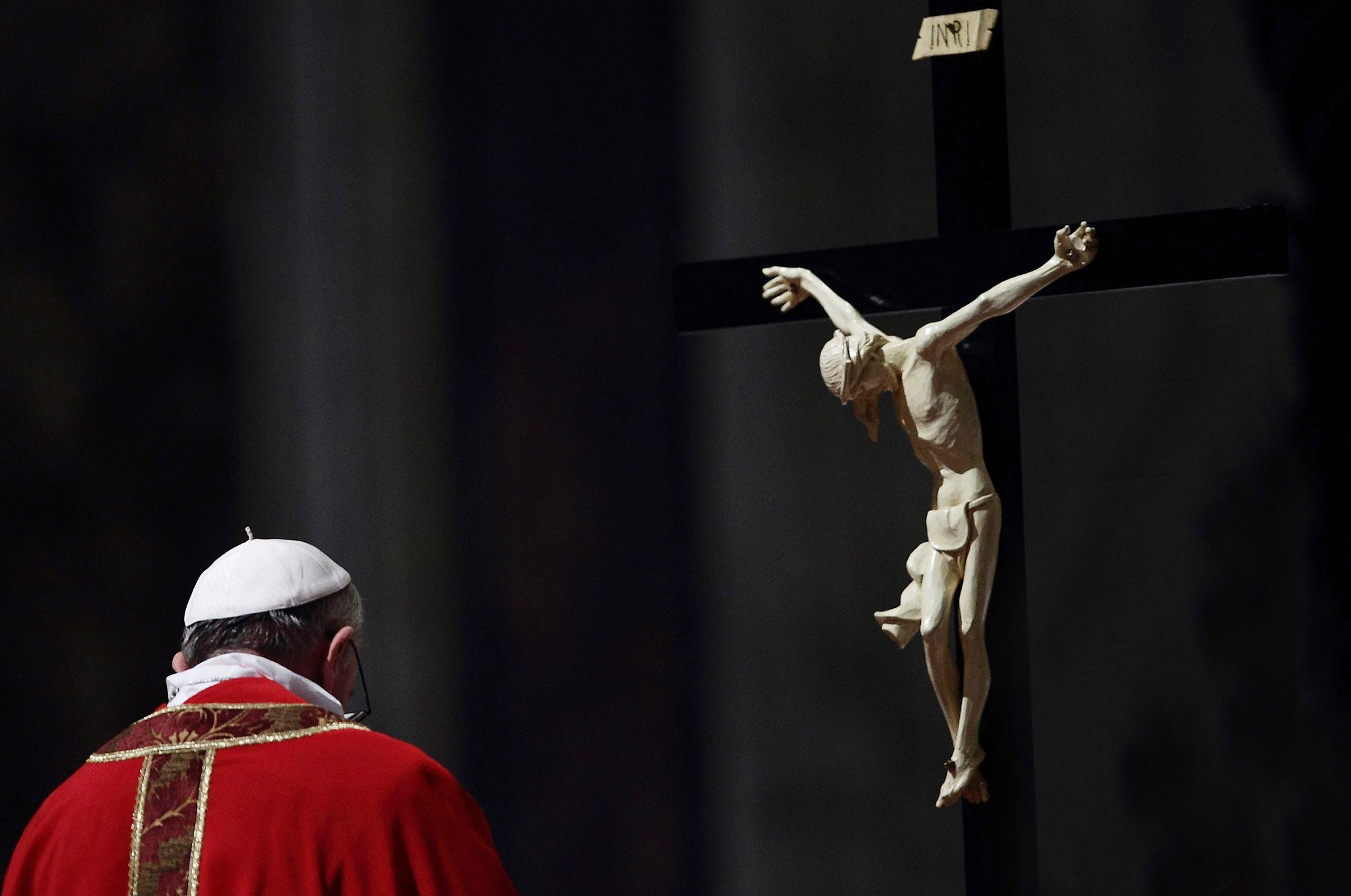
Where the Catholic traditionalists and progressives are far more divided, is over sexual politics: contraception, divorce, gay marriage and abortion. Orthodox Catholic teaching is that birth control is immoral, homosexual sex is unnatural and sinful, marriage is "permanent and indissoluble", so Catholics who remarry cannot receive Communion, and abortion is evil in every circumstance.
But large numbers of ordinary Catholics do not accept all of this. One of Francis's more revolutionary acts in his first year has been to send a questionnaire to lay Catholics asking what they think of the Church's teachings on sexual issues. But will he take notice of their views?
Francis's own position on sexual issues has been ambiguous. In his first interview after becoming Pope, he told a Jesuit publication that the Church had been unhealthily fixated on issues such as abortion, contraception and homosexuality, and had neglected its duty to help those who are poor and marginalised. Yet as Pope, in his daily homilies and elsewhere, Francis has repeatedly referred to the need to value human life, from conception until natural death. And when thousands of US anti-abortion activists held a protest, he backed them on Twitter, telling his 11.5 million followers: "I join the March for Life in Washington with my prayers".
Elsewhere, however, he is more nuanced. Before becoming Pope, he condemned gay marriage in theological terms as an "anthropological regression" but was in favour of same-sex civil unions on human-rights grounds. He is opposed to gay adoption, but frames that, too, in terms of human rights: a child having the right to a mother and a father. On Communion for the divorced he has recently said: "The Eucharist is not a prize for the perfect, but a powerful medicine and nourishment for the weak" and called for a forgiving Church.
There is more to this than the politics of balance which Pope John XXIII embodied when he said: "I have to be Pope both for those with their foot on the accelerator and those with their foot on the brake".
What it more fundamentally reveals is the most basic element in the Francis revolution. He is letting a thousand flowers bloom because his profound belief is that diversity and inclusion need to be restored to a church whose very name – catholic – means universal. Church jargon for this is collegiality.
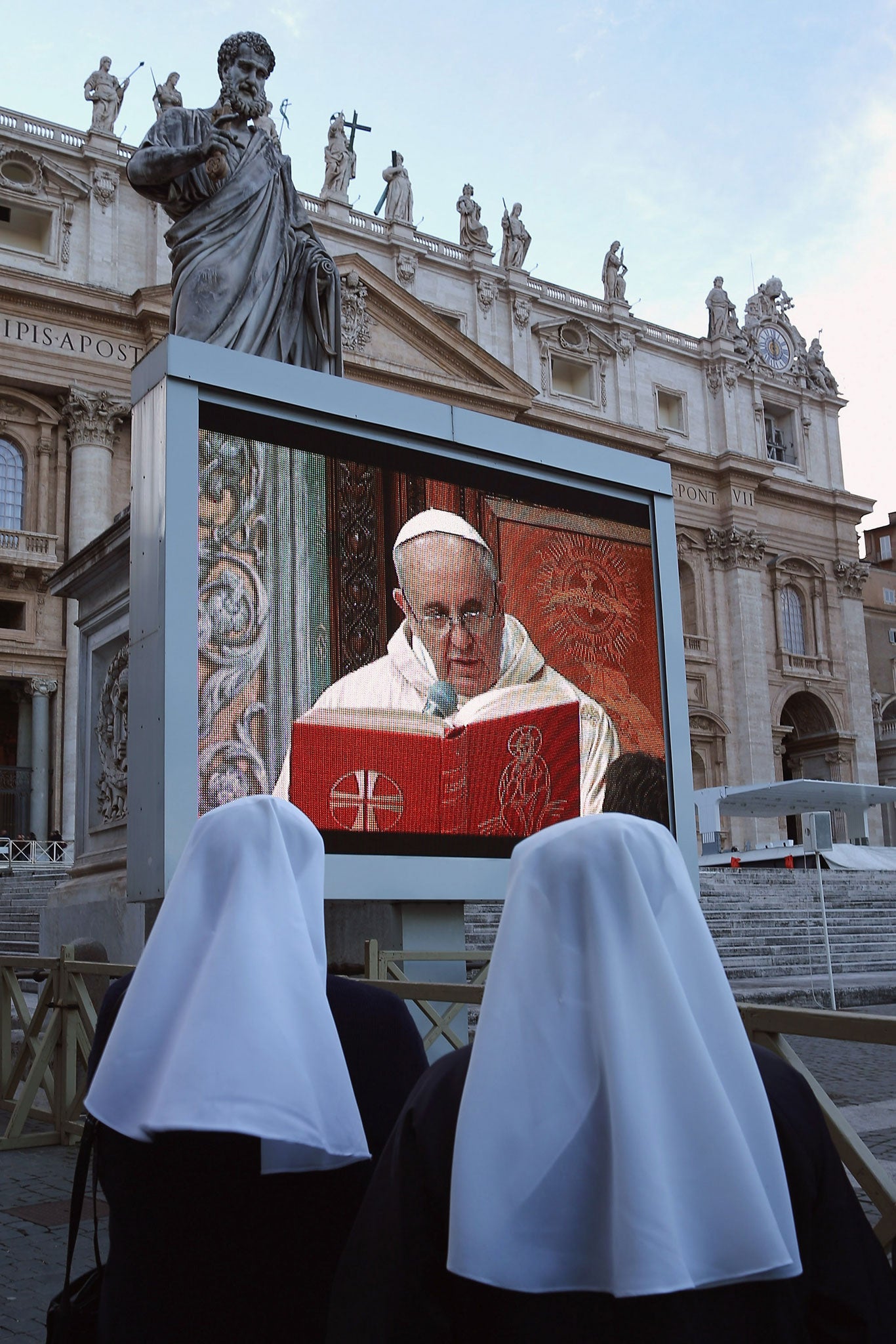
Collegiality is the other great axis of division inside Catholicism. The last two popes were essentially on the side of centralising authority within the Church. But Francis is a pope of the periphery who believes that the Vatican should be the servant of the local church, not its master. Authority should be shared by bishops all around the world. All eight of those he has chosen for his C8 are firmly in the same camp.
For Francis, this dates back to his 18 years as a bishop and archbishop in Buenos Aires. There, he became immensely impatient with comparatively junior Vatican officials treating bishops and cardinals around the world with an infantilising disregard. He resented Curia underlings who routinely rejected his recommendations for who should become new Argentinian bishops. He was disdainful of what his former aide, Guillermo Marcó, called "Italians with emptying churches telling bishops in countries with growing congregations what they should and should not be doing". Above all, he wants decisions taken by the Church to be made by a consensus of Catholics – bishops, clergy and laity – around the world. Whether or not Francis is a liberal, he is certainly revolutionary in that respect.
Three challenges face him. The first is to ensure that his revolution is not reversed by some future conservative pope. That is why the constitutional reform being explored by the C8 is so crucial. To prevent any reforms they make being unpicked, the synod of bishops should be empowered to supervise and vet all future appointments of personnel to the Curia.
The second challenge concerns the place of women in the Church. A new "theology of women" is required, Francis has said, but it is not clear what that means. He has ruled out women priests, and the idea of making women cardinals, though he could make them deacons if he chose to, with a simple change to canon law.
Again he has sent mixed signals. Within a month of his taking over, the Congregation for the Doctrine of the Faith (CDF), the doctrinal enforcer, had reaffirmed a censure by Pope Benedict XVI against American nuns. The Vatican had accused them of "radical feminism" with too much ministering to gays and lesbians and not enough anti-abortion campaigning. But in a private meeting with nuns and members of male religious orders from Latin America, he told them to ignore criticisms by the CDF.
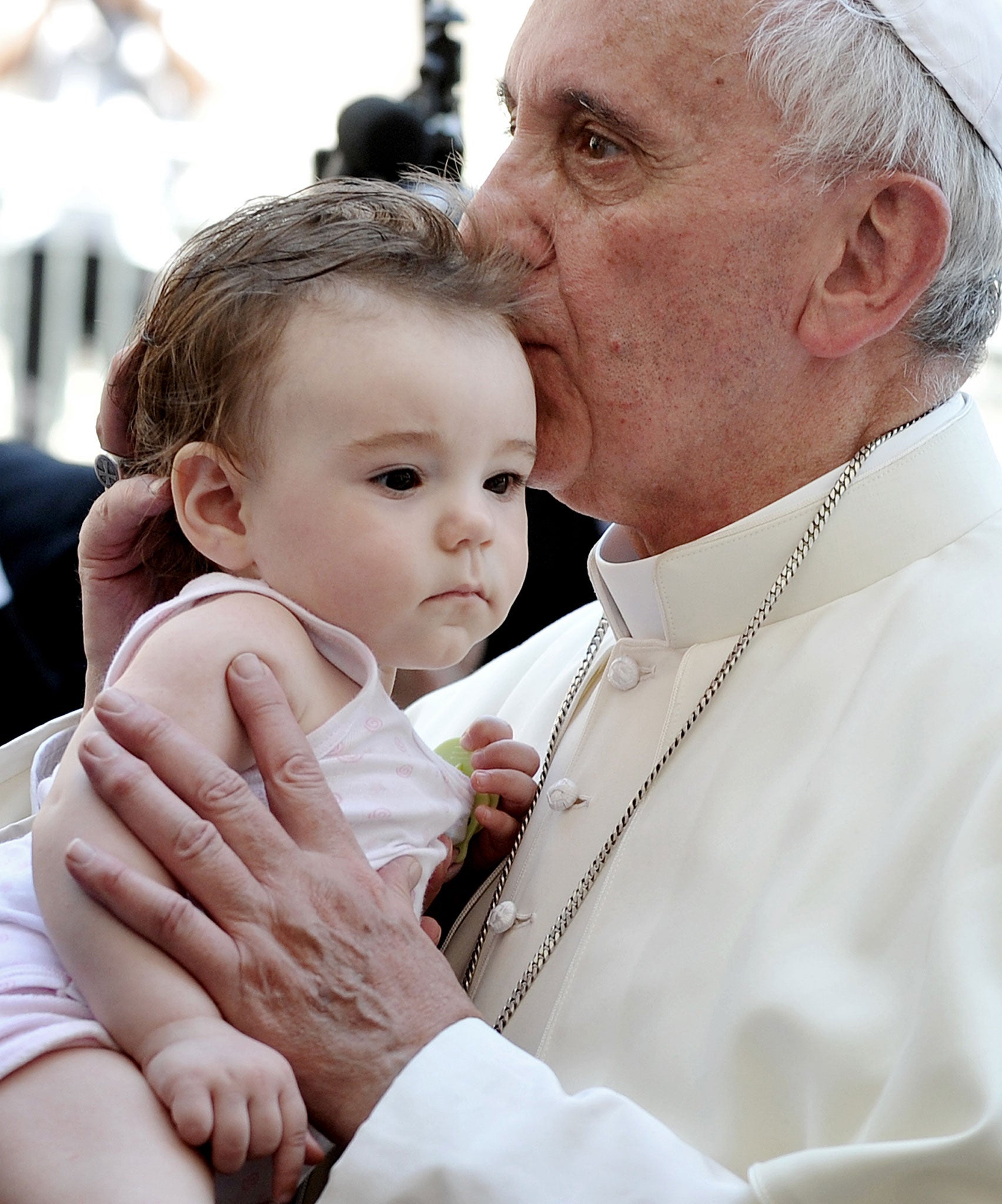
The jury is out. Many say that Francis's idealising of women – the traditional peasant piety of his grandmother and mother were formative influences – is as patronising as was previous churchmen's demonising of women. But there is also talk of women being put in leadership roles inside the Curia to civilise attitudes within the celibate clerical club.
The third challenge is over the institutional church's complicity in cover-ups of paedophile priests. A recent UN report highlighted tens of thousands of crimes by priestly abusers over several decades in a dozen countries. Francis has an equivocal record on this. In Buenos Aires he took a tough line on abuse, ridiculing the practice in the US, UK and Ireland of simply moving paedophile priests to a new parish. He told fellow bishops in Argentina to remove suspects from active ministry and try them in a church court. But he did not advocate involving the police, which is a key demand of many victims' groups, and in his time the Argentine bishops missed the Vatican 2010 deadline to create safeguards against new abuse.
In his first year, Pope Francis has not spoken publicly at any length on clerical sex abuse. In private, he has told officials in the CDF to act decisively. He has announced a new Commission on the Protection of Minors. But he has yet to reveal who will sit on it – or what its brief will be. And a papal diplomat recently accused of sexually abusing boys in the Dominican Republic was not reported to the police there; instead, he was recalled to the Vatican for prosecution.
The truth is that the Vatican is split over whether offending priests should be reported to the civil authorities or dealt with by internal Church procedures. But Pope Francis should be in no doubt that the latter will not be enough to satisfy victims, who want to see abusers reported direct to the police. Anything less will see his Church continue to stand in the pillory of public condemnation.
On his first appearance on the balcony a year ago, Pope Francis said that before he gave the traditional blessing to the city and to the world, he wanted to ask a favour – that its people should first pray for him. The biggest theme of the new Pope's preaching in his first 12 months has been the need for the Church to show mercy. He should be clear that, if his extended honeymoon with the wider public is to continue, his Church also needs to ask for mercy on the abuse scandal.
If he does, there is no knowing where the Francis revolution may end.
Paul Vallely's biography, 'Pope Francis – Untying the Knots', is published by Bloomsbury, £12.99
Join our commenting forum
Join thought-provoking conversations, follow other Independent readers and see their replies
Comments